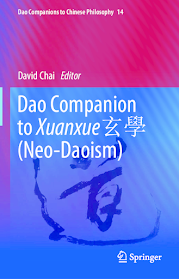Editor:
Chai, David
Publisher:
Springer
Publication date:
September 30, 2020
Abstract:
This comprehensive volume surveys an important but neglected period of Chinese intellectual history: Xuanxue (Neo-Daoism). It provides a holistic approach to the philosophical and religious traits of this movement via the concepts of non-being, being, and oneness. Thinkers and texts on the periphery of Xuanxue are also examined to show readers that Xuanxue did not arise in a vacuum but is the result of a long and continuous evolution of ideas from pre-Qin Daoism.
The 25 chapters of this work survey the major philosophical figures and arguments of Xuanxue, a movement from the Wei-Jin dynastic period (220-420 CE) of early-medieval China. It also examines texts and figures from the late-Han dynasty whose influence on Xuanxue has yet to be made explicitly clear. In order to fully capture the multifaceted nature of this movement, the contributors brilliantly highlight its more socially-oriented characteristics.
Overall, this volume presents an unrivaled picture of this exciting period. It details a portrait of intellectual and cultural vitality that rivals, if not surpasses, what was achieved during the Warring States period. Readers of the Yijing, Daodejing, and Zhuangzi will feel right at home with the themes and arguments presented herein, while students and those coming to Xuanxue for the first time will acquire a wealth of knowledge.
Table of Contents:
Introduction
Chai, David
Chai, David
Xuanxue’s Contributions to Chinese Philosophy
Sellmann, James D.
The Metaphysical Style and Structural Coherence of Names in Xuanxue
Rošker, Jana S.
Sellmann, James D.
The Metaphysical Style and Structural Coherence of Names in Xuanxue
Rošker, Jana S.
Oneness in the Taipingjing
Hendrischke, Barbara
Hendrischke, Barbara
Yin and Yang in the Taipingjing
Hendrischke, Barbara
Hendrischke, Barbara
Dao and Ziran in Heshanggong’s Commentary on the Daodejing
Tadd, Misha
Tadd, Misha
The Walking Dead: Morality, Health, and Longevity in the Xuanxue Method of the Xiang’er Commentary on the Laozi
Littlejohn, Ronnie
Littlejohn, Ronnie
Wang Chong’s View of Ziran and its Influence on Wang Bi and Guo Xiang
McLeod, Alexus
McLeod, Alexus
He Yan’s “Essay on Dao” and “Essay on the Nameless”
D’Ambrosio, Paul
D’Ambrosio, Paul
He Yan’s Collected Explanations on the Analects
Lo, Yuet Keung
Lo, Yuet Keung
Ruan Ji’s “On Comprehending the Zhuangzi”
Chai, David
Chai, David
Ji Kang’s “On Dispelling Self-Interest”
Chai, David
The Aesthetics of Musical Emotion in Ji Kang’s “Music has in It Neither Grief nor Joy”
Park, So Jeong
Park, So Jeong
The Ontology of Change: Wang Bi’s Interpretation of the Yijing
Hon, Tze Ki
Hon, Tze Ki
Language and Nothingness in Wang Bi
Nelson, Eric S.
Nelson, Eric S.
Metaphysics without Ontology: Wang Bi and the Daodejing
Fox, Alan
Fox, Alan
Re-envisioning the Profound Order of Dao: Pei Wei’s “Critical Discussion on the Pride of Place of Being”
Chan, Alan K. L.
Chan, Alan K. L.
Metaphysics and Agency in Guo Xiang’s Commentary on the Zhuangzi
Fraser, Chris
Fraser, Chris
Lone-Transformation and Intergrowth: Philosophy and Self-Justification in Guo Xiang’s Commentary on the Zhuangzi
Lo, Yuet Keung
Lo, Yuet Keung
Guo Xiang’s Theory of Sagely Knowledge as Seen in his “Essentials of the Analects”
Lynn, Richard J.
Lynn, Richard J.
Ge Hong and the Darkness
Raz, Gil
Raz, Gil
Seeking Immortality in Ge Hong’s Baopuzi Neipian
Pregadio, Fabrizio
Ge Hong’s Evolving Discourse on You and Wu and its Roots in the Daodejing
Michael, Thomas
Michael, Thomas
The Xuanxue Lifestyle: Self-Cultivation and Qi Practices
Kohn, Livia
Kohn, Livia
Zhi Dun on Freedom: Synthesizing Daoism and Buddhism
Zhang, Ellen Y.
Zhang, Ellen Y.

No comments:
Post a Comment